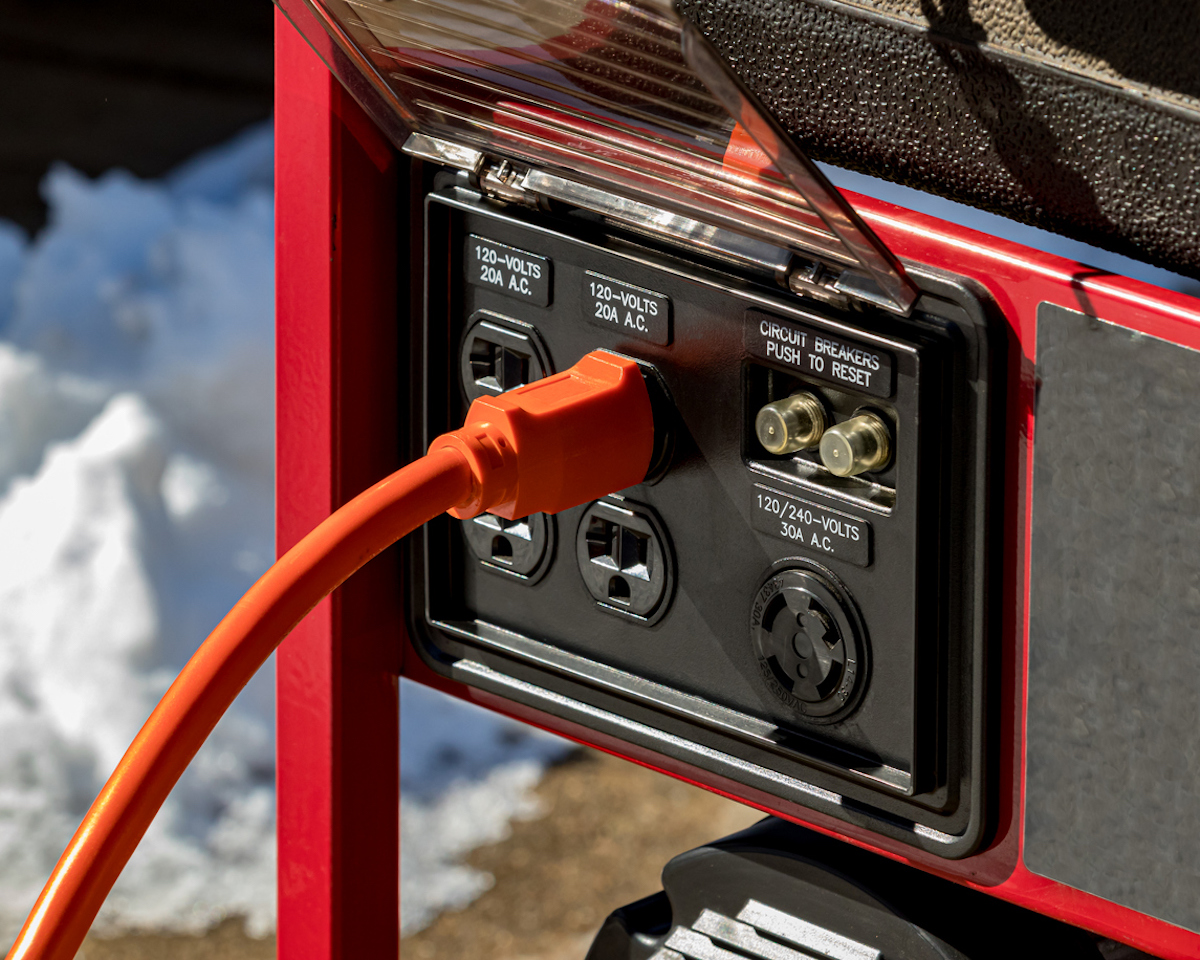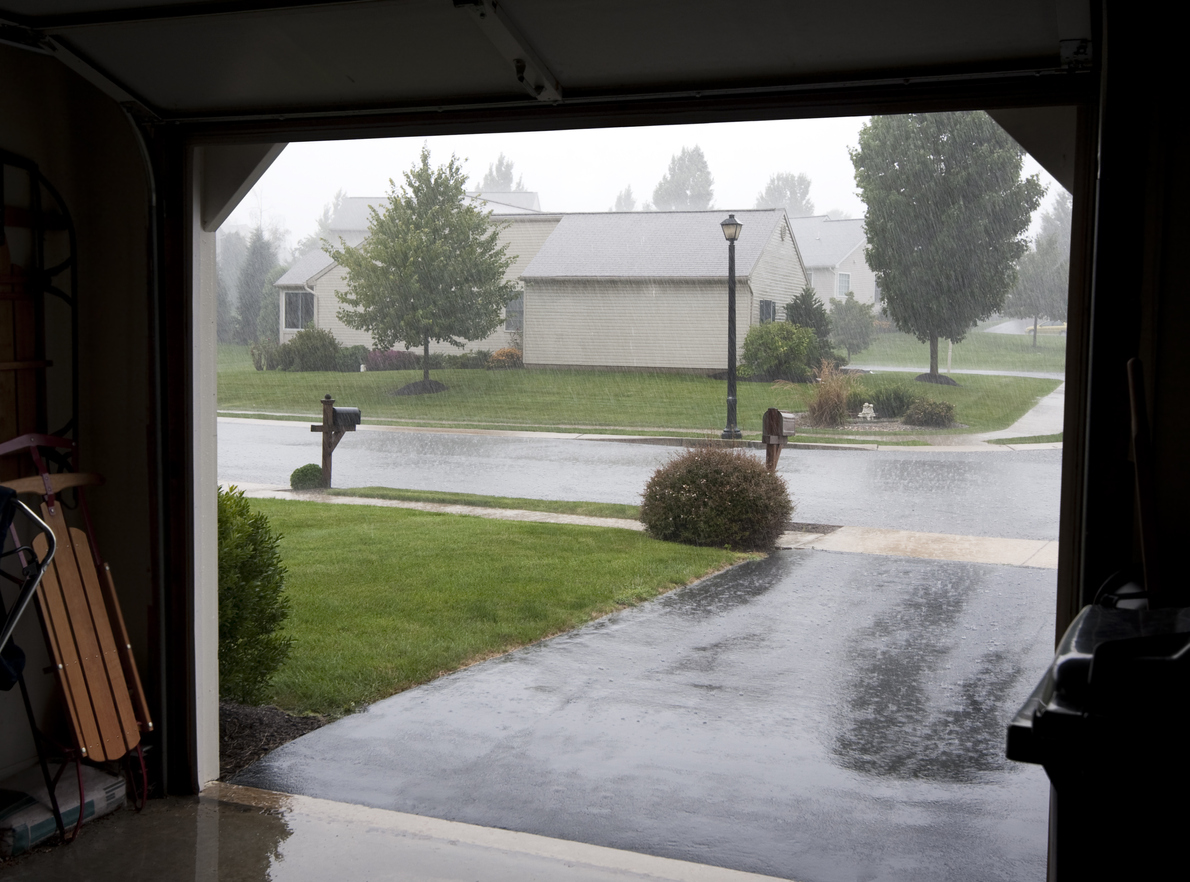We may earn revenue from the products available on this page and participate in affiliate programs. Learn More ›
A portable generator should not be used in the rain because the moisture in the air and the water accumulating on the ground can seep into the outlets or leak into the engine. When this occurs, anyone nearby is at risk of electrocution. Additionally, severe water damage during operation could cause the portable generator to explode, so it’s important to keep the generator stored safely indoors.
However, power outages often occur during poor weather, so it’s worth asking can you operate a generator in the rain? If it’s absolutely necessary, there are methods for protecting your generator from rain, including steel enclosures, plastic sheds, pop-up canopy tents, and other generator rain cover options. Ahead, we’ll explain how to safely use a portable generator in rainy weather.
Why You Shouldn’t Run a Portable Generator During the Rain
A common question homeowners ask is, can generators get wet? However, generators operate by burning flammable fuels to produce powerful voltage. When moisture gets into the outlets or seeps into the engine, it can result in electrocution or an explosion. So the follow-up question then becomes, can you run a portable generator in the rain? Even the best generator brands specify that portable generators are not designed for use in the rain or other wet conditions because the water can damage the generator and pose a safety risk to anyone nearby.
Another important point is that a generator requires proper ventilation to function, so simply tossing a tarp over the generator isn’t enough to both protect the machine and provide appropriate ventilation. Invest in an operational cover, designed for protection and functionality. Do not allow a portable generator to get wet or operate uncovered in the rain.
Portable generators can be stored—but never used—indoors.

Portable generators should not be used indoors, even during a power outage. While the purpose of a generator is to create electricity that can be used to power your electrical devices, lights, and appliances, in order to generate that electricity, a portable generator must burn a fuel source, like propane, gasoline, or diesel. When these fuels are burned, they produce fumes that can quickly accumulate and become toxic in a sealed or enclosed space, like the garage or inside the home, putting you at risk of carbon monoxide poisoning.
Some people may think that a smaller generator size is safe, or that a portable generator can be used in the garage as long as the door is open, but carbon monoxide is an invisible, tasteless, odorless gas that can easily be trapped in the confines of the garage instead of being released safely outdoors and you wouldn’t know until it became a hazard. Store the generator inside when it’s not in use, but never run the generator indoors.
Generator Cover Options

A portable generator should not be used in severe storms. While an operational generator cover is designed to protect and provide appropriate ventilation for the ongoing use of the generator, the cover can be blown off or otherwise dislodged, leaving the generator vulnerable to rain. However, an operational cover can be used in light to heavy rain to provide adequate protection to the home generator, allowing it to power appliances and connected devices. Consider these four options for generator covers.
- Steel enclosures offer the highest level of durability and safety, though it’s recommended to have these enclosures professionally installed to ensure that they are waterproof.
- Plastic sheds can work as a generator cover and are more durable than a light cloth or plastic covering, but plastic sheds often have problems with overheating because they insulate the generator. If you choose this route, make sure the shed is properly ventilated.
- Pop-up canopy tents are affordable and easy to use, though they lack durability and are prone to being blown away by powerful wind.
- Custom DIY generator covers can also be effective, but you need to know what you are doing, otherwise the cover may not be properly waterproofed or it may not have the right ventilation, resulting in the generator overheating.
How to Protect Portable Generators from the Rain
It’s important to know how to use a generator before attempting to operate it in poor conditions. Follow these steps to safely set up, protect, and operate your portable generator in the rain.
1. Designate a solid, dry, outdoor space for operating the generator.
When it rains or snows, you will need to protect the generator from all sides, including the bottom, so it’s important to find a solid, dry space outdoors where the generator can sit. Do not select any areas that tend to puddle or pool with water during rain; instead look for a place that sits higher than the rest of the yard. If you don’t have a solid, dry place for the generator, consider doing some landscaping to create a safe spot for the generator.
2. Cover the generator.
With the generator located in a suitable location, the next step is to find a generator cover that can protect the top and sides of the generator without causing the machine to overheat. Consider whether it would be best to invest in a steel enclosure, a plastic shed, a simple pop-up canopy, or to build your own custom generator cover. Just make sure to take into consideration the ventilation requirements to keep the generator cool and running efficiently if you choose to tackle this project on your own.
Our Recommendation: GenTent Generator Running Cover on Amazon.com for $159.99
A sturdy steel pole attaches to the generator’s frame via a set of clamps, making this cover strong enough to resist winds of up to 70 miles per hour or 18 inches of snow.
3. Ensure the power cord connected to your home is weatherproof.
Positioning and protecting a generator aren’t the only things to worry about. You also need a weatherproof power cord that can travel between the generator and your appliances. Locking power cords help prevent the cord from coming loose during heavy winds— just make sure you choose a power cord that is both weatherproof and compatible with your generator.
Our Recommendation: Yodotek Generator Locking Power Cord on Amazon for $54.88
The weather-, water-, and fire-resistant design ensures that this locking power cord will stay safe during rain, sleet, and snowstorms.
Are There Generators That Work in the Rain?
Whole-house backup generators are made with protective covers to keep them safe during rain, sleet, and snow, making a whole-house generator installation the best option for providing power to the entire home in an emergency.
Some homeowners may also be concerned about the type of fuel the standby generator is using, asking questions like, can you run a gasoline generator in the rain? But, rest assured, as long as the generator has an appropriate cover, it can use propane, gasoline, or natural gas without an issue.
Though if you are concerned about the usual rush to gas stations during a power outage, then it may be a good idea to invest in a whole-house backup generator that operates on natural gas. There are also types of generators that run on propane or diesel fuel and produce enough energy to run the home for several days.


